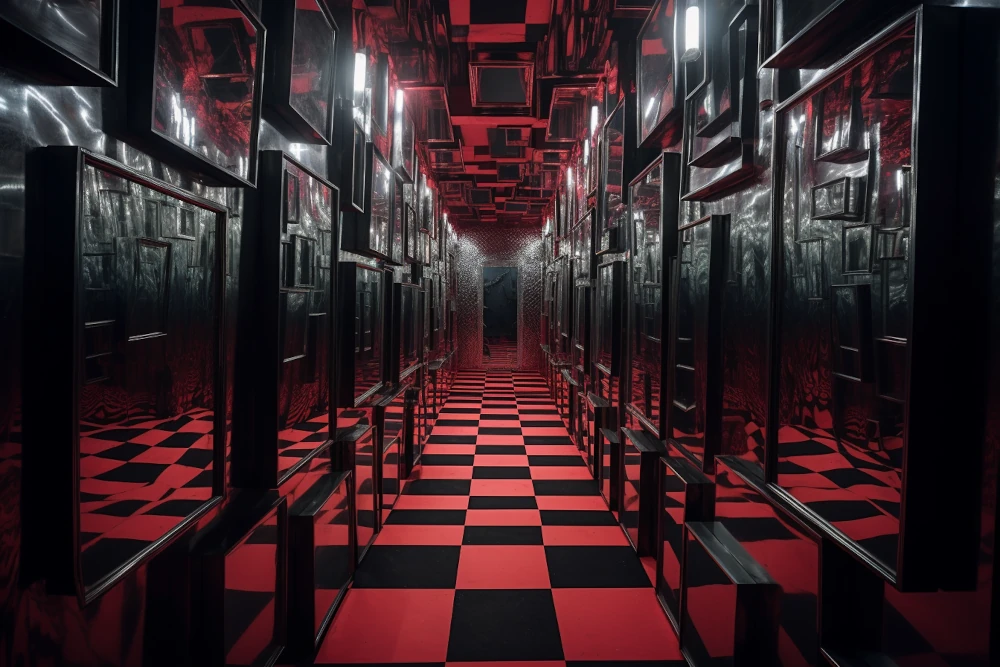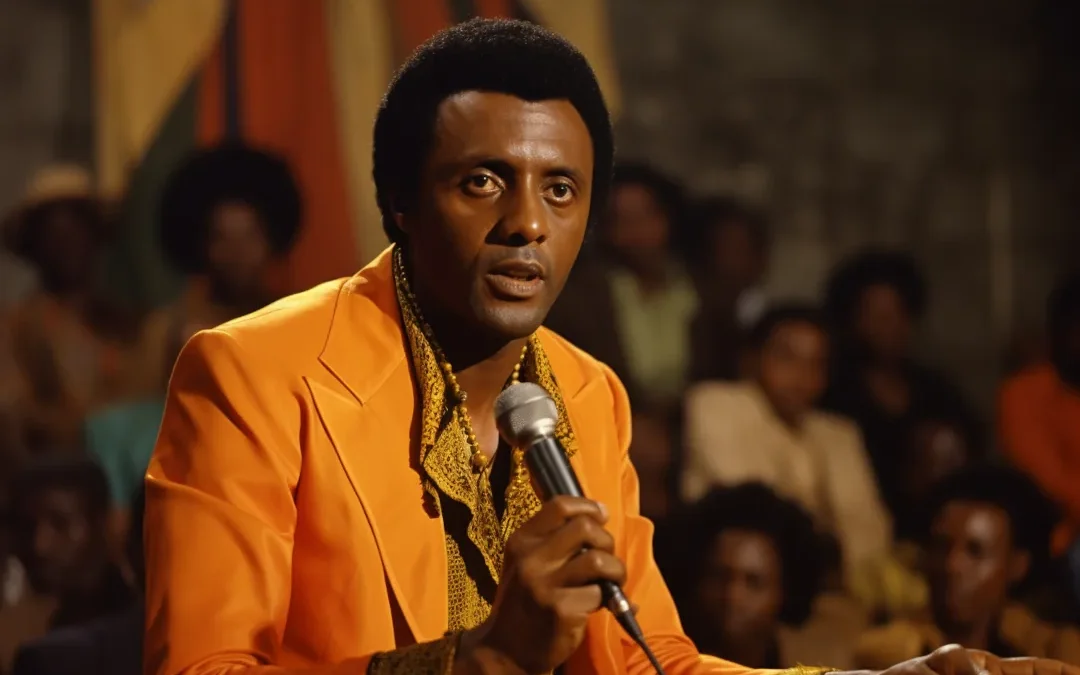Throughout the first ten or fifteen minutes of They Cloned Tyrone, you get the impression that 1970s blaxsploitation has been rejuvenated. Not only do the characters, setting, and plot resemble these artifacts of the past, but the entire aesthetic of the genre has been captured. The cinematography, music, color, all of it. Think of Tarantino, like with Jackie Brown.
But unlike with Tarantino, this film has an authenticity to it. It doesn’t paint the genre as cool. The film has a darkness—literally in the lighting of the scenes and figuratively in the content—that deviates from the inspiration. Unlike Tarantino, director and co-writer Juel Taylor treats blaxsploitation as a genre to be critically assessed.
Weirdly Authentic
They Cloned Tyrone makes an interesting use of its title. Had the film been called practically anything else, its weirdness might warrant a spoiler alert. The eponymous Tyrone does not show up for most of the movie, but the first act does not seem to be the type of film involving human cloning.
Our primary characters are a drug dealer, a pimp, and a prostitute. The drug dealer, Fontaine (John Boyega), ruthlessly protects his territory despite inviting imminent retaliation. He then tracks down the pimp, Slick Charles (Jamie Foxx), who owes money for drugs. Slick Charles, engaged in a dispute with his prostitute Yo-Yo (Teyonah Parris), can only protest as Fontaine searches his motel room for the last of his money.
After leaving Slick Charles’ motel room, Fontaine’s nemesis shoots him six times. He’s dead. Or is he? Fontaine wakes up in his bed without a single wound. It appears to have been a dream. He goes about his life as normal. But Slick Charles and Yo-Yo witnessed the murder and confirm that it was no dream. The three embark on a mission to solve the mystery of Fontaine’s resurrection, leading to a ruthless satire.
They Cloned Tyrone has a weird authenticity about it. Despite quickly devolving into sci-fi and dealing with tropes and cliches, it never feels fake.
Performances and Dialogue
Jamie Foxx puts on a performance that elevates every scene in They Cloned Tyrone. Fontaine, a stereotypical tough and silent type, does not provide much dialogue while Foxx relentlessly lays on the laughs. Functionally, this works similar to a role Kevin Hart typically plays, like in the horrible The Man from Toronto. It’s an old cliche often found in buddy cop films (see The Nice Guys), and usually wears thin throughout the course of a film as the jokes are hit or miss. Not so in They Cloned Tyrone. Foxx’s lines never feel superfluous and they consistently incite real laughter, not minor chuckles.
Yo-Yo has a different dynamic. Although ostensibly a cliche hooker with a heart of gold, the writers deserve credit for putting a meaningful spin on the trope. As a non-clone, Yo-Yo has real hopes, aspirations, and dreams that are crushed by her social circumstances. Circumstances systemically enforced by the conspiracy. Unlike most well-meaning hookers, Yo-Yo functions as a scathing satire, whereas traditionally this role merely romanticizes the world’s oldest profession and infantilizes women.
Overall, the dialogue and acting elevate the film. They Cloned Tyrone has the sort of dark humor that injects slapstick in the middle of heady issues. The writers crafted the perfect voice for this mode and the actors delivered.
Conspiracy and They Cloned Tyrone
At the heart of They Cloned Tyrone lies a conspiracy. A conspiracy to manipulate black people culturally through marketing, social conditions, and ghettoizing. Broadly speaking, that sounds like reality, and that is the point. At a time when conspiracy theories proliferate and cause real harm, They Cloned Tyrone smartly goes for the grand and ridiculous. Only the truly insane would mistake the film’s conspiracy for anything more than a metaphor.
At the same time, this metaphorical structure immediately evokes Get Out. Zoom out far enough and the two films appear to be oddly similar. The details matter, though, and The Cloned Tyrone aims for a bigger target. Get Out has a tight structure. It’s a clear and specific allegory. It does one thing and does it extremely well. Or, put another way, one could say that They Cloned Tyrone makes explicit many of the implicit questions posed by Get Out.
They Cloned Tyrone looks at the messy details. For example, what parts of black culture are organically black and which parts have the black community been duped into adopting by white salesmen? Are the key identifiers of black culture merely diversions designed to distract the black community away from civic participation and betterment? It’s easier to question the seedier aspects, such as our drug dealer, pimp, and prostitute. But there are no sacred cows here. They Cloned Tyrone questions everything from black churches to black music to black hair products and even fried chicken. All of black culture becomes suspect as a sort of bread and circus arrangement staged by the white man.
The conspirators create their controlling diversions by co-opting black culture and weaponizing it against the black community. Music presents the most on-the-nose example. In one scene, a DJ uses club music to hypnotize a crowd and orders them to attack our protagonists. In another, the conspirators test the effects of music on subjects, alternating them between docile and aggressive. Corporations appropriate black music and strategically distort it for profit and control.
They Cloned Tyrone attacks assimilation, echoing the message of Malcolm X. The long term goal of the conspiracy is to genetically turn black people into white people. Clearly this is a metaphor for adopting white culture, but the questions the film raises about the authenticity of black culture complicates the problem. If corporations regurgitate black culture and spoon feed a tainted version back to the black community, what cultural identity can the community cling to? Are they placed in a paradox, choosing between one simulacrum or another? How can the black community find identity from within when it constantly gets stolen and used against them?
The characters choose to riot. The riot becomes justified as an attack on the system of control, the system of catch-22s and deceptive notions of freedom. Only through unified violence can they defy the systemic shackles.
The final act of They Cloned Tyrone may be its only real weakness. In the tradition of satire, the film attacks but offers no viable solutions. No direct recourse exists in real life that mimics that in the film. The final act becomes so preoccupied with wrapping up the plot that the magic of the first two acts fades.
Allegory and Metaphor
In my review of The Bad Bad, I criticized a clumsy handling of allegory. I also laid out three rules (that I made up on the spot) concerning allegory:
- An allegory must be seamless with the narrative. You can’t justify a dumb plot that doesn’t make any sense by pointing out all the symbolism and hidden meaning. The plot must stand on its own, and the allegory compliments it.
- An allegory must not only make the story symbolize something in the real world, it must tell us something unique or interesting about the things it symbolizes. Like all forms of analogy, it must enlighten us to the subject at hand in ways more powerful than literalism.
- The allegory must be unlike the situation it represents.
They Cloned Tyrone scores on all three points. Concerning the last one, one could accuse the film of being slightly on-the-nose, but our vehicle is a conspiracy while our tenor is systemic racism. We do not need to fully abstract things for allegory to function successfully. Over-abstraction often causes allegories to go completely unnoticed by the audience.
The most important rule is #1. The story has to be good even without the allegorical considerations. They Cloned Tyrone is just good. It’s hilarious, well paced, and the mystery strings you along, eager to see how each scene will unfold. Even those who don’t want to get into all the metaphorical nuance will find it to be a great film.




